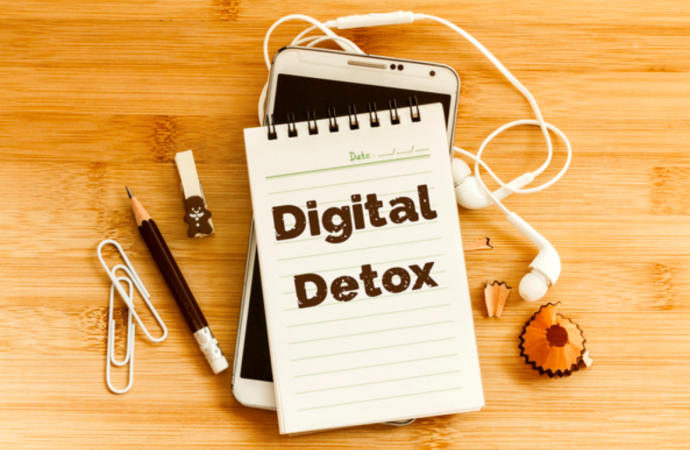In today’s hyper-connected world, our reliance on digital devices has reached unprecedented levels. Smartphones, tablets, laptops, and smartwatches have become integral parts of our daily lives, offering convenience, entertainment, and connectivity. However, this digital immersion comes at a cost. The constant barrage of notifications, emails, and social media updates can lead to information overload, stress,
In today’s hyper-connected world, our reliance on digital devices has reached unprecedented levels. Smartphones, tablets, laptops, and smartwatches have become integral parts of our daily lives, offering convenience, entertainment, and connectivity. However, this digital immersion comes at a cost. The constant barrage of notifications, emails, and social media updates can lead to information overload, stress, and a host of other mental health issues. This is where the concept of digital detox comes into play. A digital detox, the intentional disconnection from digital devices, is increasingly recognized as essential for mental wellbeing.
Understanding Digital Detox
A digital detox involves taking a break from digital devices to reduce stress, improve focus, and foster a healthier relationship with technology. This break can range from a few hours to several days or even weeks, depending on individual needs and circumstances. The goal is to unplug and reconnect with the physical world, thereby reaping the benefits of improved mental health and overall wellbeing.
The Impact of Digital Overload on Mental Wellbeing
Before delving into the benefits of a digital detox, it’s important to understand how digital overload affects mental wellbeing. Here are some key points:
- Stress and Anxiety: Constant notifications and the pressure to stay connected can lead to chronic stress and anxiety. The fear of missing out (FOMO) exacerbates these feelings, making it difficult to relax and unwind.
- Sleep Disturbances: Exposure to blue light from screens can interfere with the production of melatonin, a hormone that regulates sleep. This can lead to sleep disturbances, which in turn affect mood, cognitive function, and overall health.
- Reduced Attention Span: The constant switching between apps, emails, and social media platforms can reduce our attention span and impair our ability to focus on tasks. This can lead to decreased productivity and increased feelings of overwhelm.
- Social Isolation: Paradoxically, while digital devices are designed to connect us, they can also lead to social isolation. Spending excessive time online can detract from face-to-face interactions, leading to a sense of loneliness and disconnection.
- Mental Fatigue: The relentless consumption of digital content can lead to mental fatigue, making it difficult to process information and think critically. This can contribute to feelings of burnout and decreased mental clarity.
Benefits of Digital Detox for Mental Wellbeing
A digital detox can offer numerous benefits for mental wellbeing. Here are some of the most significant:
- Reduced Stress and Anxiety: Taking a break from digital devices allows the mind to rest and recharge. Without the constant influx of information and notifications, individuals can experience a significant reduction in stress and anxiety levels.
- Improved Sleep Quality: By limiting screen time, especially before bed, individuals can improve their sleep quality. This can lead to better mood, enhanced cognitive function, and overall improved health.
- Enhanced Focus and Productivity: Disconnecting from digital distractions can help individuals regain their focus and improve their productivity. This can lead to a greater sense of accomplishment and reduced feelings of overwhelm.
- Strengthened Relationships: A digital detox encourages individuals to engage in face-to-face interactions, fostering deeper connections with family and friends. This can enhance social support and reduce feelings of loneliness.
- Increased Mindfulness: Without the constant distraction of digital devices, individuals can practice mindfulness and be more present in the moment. This can lead to greater self-awareness and improved emotional regulation.

Image by: Yandex.com
Practical Tips for a Successful Digital Detox
Embarking on a digital detox can be challenging, especially in a world where digital devices are ubiquitous. However, with some practical tips and strategies, it is possible to successfully disconnect and reap the benefits for mental wellbeing. Here are some tips to get started:
- Set Clear Goals: Define the purpose and duration of your digital detox. Whether it’s to reduce stress, improve sleep, or enhance focus, having clear goals can help you stay committed.
- Create Boundaries: Establish specific times and places where digital devices are off-limits. For example, you might decide to avoid screens during meals or before bedtime.
- Inform Others: Let family, friends, and colleagues know about your digital detox. This can help manage expectations and reduce the pressure to stay connected.
- Engage in Offline Activities: Use the time away from digital devices to engage in activities that promote mental wellbeing, such as reading, exercising, or spending time in nature.
- Practice Mindfulness: Incorporate mindfulness practices, such as meditation or deep breathing, to help manage stress and stay present in the moment.
- Gradual Reduction: If a complete digital detox feels overwhelming, start by gradually reducing screen time. For example, you might begin by limiting social media use to specific times of the day.
- Use Technology Wisely: When you do use digital devices, be mindful of how you use them. Opt for activities that promote learning and growth, rather than mindless scrolling.
Conclusion
In an age where digital devices dominate our lives, a digital detox is not just a luxury but a necessity for mental wellbeing. By intentionally disconnecting from technology, we can reduce stress, improve sleep, enhance focus, and strengthen our relationships. While the prospect of a digital detox may seem daunting, the benefits it offers for mental health and overall wellbeing are well worth the effort. So, take a step back, unplug, and give yourself the gift of a digital detox. Your mind will thank you.
















